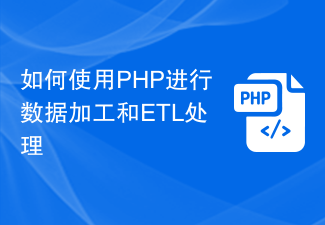
How to use PHP to develop data analysis functions
Introduction: Modern data processing and analysis have become the key to the success of businesses and organizations. With the generation and storage of massive amounts of data, collecting, processing and analyzing data has become increasingly important. As a language widely used in web development, PHP also provides powerful data processing and analysis functions. This article will introduce how to use PHP to develop data analysis functions and provide code examples.
1. Data collection and storage
Before conducting data analysis, it is first necessary to collect and store data. PHP can use a variety of methods to collect and store data, such as submitting forms, crawling web page data, obtaining data from APIs, etc.
- Form submission:
The user fills out the form on the web page, and the PHP code receives and processes the form data and stores it in the database. For example, the following is a simple form submission code example:
<form action="process.php" method="POST">
<input type="text" name="name" placeholder="请输入姓名">
<input type="email" name="email" placeholder="请输入邮箱">
<input type="submit" value="提交">
</form><?php // process.php $name = $_POST['name']; $email = $_POST['email']; // 将数据存储到数据库中 // ... ?>
- Web page data crawling:
Using PHP's CURL function library, you can crawl data from a specified web page, and store it locally or in a database. The following is a simple web page data crawling code example:
// 要爬取的网页URL $url = 'https://example.com'; // 初始化CURL $ch = curl_init(); // 设置CURL选项 curl_setopt($ch, CURLOPT_URL, $url); curl_setopt($ch, CURLOPT_RETURNTRANSFER, true); // 执行CURL请求 $response = curl_exec($ch); // 关闭CURL curl_close($ch); // 将网页数据存储到数据库中 // ...
- API data acquisition:
Using PHP's HTTP request library, you can easily obtain data from remote APIs. The following is a simple API data acquisition code example:
// API的URL $url = 'https://api.example.com/data'; // 发送GET请求并获取响应 $response = file_get_contents($url); // 将API返回的数据存储到数据库中 // ...
2. Data processing and analysis
After obtaining the required data, the data can be processed and analyzed. PHP provides a rich data processing and analysis function library, which can easily perform statistics, filtering, sorting, aggregation and other operations.
- Statistical data:
Using PHP's built-in function library, you can easily count the maximum value, minimum value, average value, etc. of data. The following is a simple code example:
$data = [10, 20, 30, 40, 50]; // 计算数据的最大值 $max = max($data); // 计算数据的最小值 $min = min($data); // 计算数据的平均值 $avg = array_sum($data) / count($data);
- Filtering data:
Using PHP's array functions, you can easily filter data to find subsets that meet specified conditions. The following is a simple code example:
$data = [10, 20, 30, 40, 50];
// 筛选出大于30的数据
$newData = array_filter($data, function($value) {
return $value > 30;
});- Data sorting:
Using PHP's array functions, you can sort data easily. The following is a simple code example:
$data = [30, 10, 50, 20, 40]; // 对数据进行升序排序 sort($data); // 对数据进行降序排序 rsort($data);
- Data aggregation:
Using PHP's array functions, you can easily perform data aggregation operations, such as summing, counting, grouping, etc. The following is a simple code example:
$data = [10, 20, 30, 40, 50]; // 对数据进行求和 $sum = array_sum($data); // 对数据进行计数 $count = count($data); // 对数据进行分组 $groupedData = array_chunk($data, 2);
Conclusion: PHP, as a popular web development language, provides powerful data processing and analysis functions. By using PHP's data collection, storage, processing and analysis technology, various data analysis needs can be easily realized. This article describes how to use PHP for data collection, processing, and analysis, and provides corresponding code examples. I hope readers can understand and master these technologies through this article and further leverage the advantages of PHP in the field of data analysis.
The above is the detailed content of How to use PHP to develop data analysis functions. For more information, please follow other related articles on the PHP Chinese website!
 如何使用PHP开发数据分析功能Aug 25, 2023 pm 10:09 PM
如何使用PHP开发数据分析功能Aug 25, 2023 pm 10:09 PM如何使用PHP开发数据分析功能引言:现代数据处理和分析已经成为了企业和组织成功的关键所在。随着海量数据的产生和存储,采集、处理和分析数据变得越来越重要。PHP作为一种广泛应用于Web开发的语言,也提供了强大的数据处理和分析功能。本文将介绍如何使用PHP开发数据分析功能,并提供代码示例。一、数据采集与存储在进行数据分析之前,首先需要采集和存储数据。PHP可以使
 PHP中如何进行数据分析处理?May 13, 2023 am 08:19 AM
PHP中如何进行数据分析处理?May 13, 2023 am 08:19 AMPHP是一门广泛应用于Web开发的语言,通常被用来构建动态的Web应用程序。随着数据驱动型应用程序的兴起,PHP在数据分析和处理方面也变得越来越重要。本文将介绍如何使用PHP进行数据分析处理,从数据的获取、存储、分析和可视化展示等方面进行讲解。一、数据获取要进行数据分析处理,首先需要获取数据。数据可以来自各种不同的来源,例如数据库、文件、网络等。在PHP中,
 如何实现PHP底层的大规模数据处理Nov 08, 2023 pm 07:36 PM
如何实现PHP底层的大规模数据处理Nov 08, 2023 pm 07:36 PM如何实现PHP底层的大规模数据处理,需要具体代码示例在现代的软件开发中,数据处理是一个非常重要而复杂的任务。对于大规模数据的处理,尤其需要考虑到性能和效率的因素。在PHP开发中,我们可以通过优化算法和采用适当的数据结构来实现大规模数据处理的底层操作。本文将介绍一些常见的技术和具体的代码示例,帮助读者实现PHP底层的大规模数据处理。一、使用高效的数据结构在处理
 如何在PHP语言开发中准确处理传入和传出的数据?Jun 10, 2023 am 09:22 AM
如何在PHP语言开发中准确处理传入和传出的数据?Jun 10, 2023 am 09:22 AM在PHP语言中,数据的传入和传出是非常常见且重要的操作。而对于开发者来说,如何准确地处理这些数据,则是一个十分重要的课题。因此,为了帮助大家更好地掌握这个技巧,本文将简要介绍如何在PHP语言开发中准确处理传入和传出的数据。一、传入数据的准确处理过滤不安全的字符通过引用用户输入、上传或读取的数据,我们可能会引起各种问题,包括SQL注入和XSS攻击。为了防止这
 如何在PHP中处理表单数据May 11, 2023 pm 04:43 PM
如何在PHP中处理表单数据May 11, 2023 pm 04:43 PM随着互联网的不断发展,表单已经成为了网页开发中不可或缺的一部分。表单可以让用户输入需要提交的数据,进而实现与服务器之间的交互。在PHP中,处理表单数据十分方便。本文将介绍如何在PHP中处理表单数据。1.获取表单数据当用户提交表单时,PHP可以通过$_POST或$_GET变量获取表单提交的数据。其中,$_POST变量用于获取提交方式为POST的表单数
 如何使用PHP进行数据加工和ETL处理Aug 04, 2023 pm 12:29 PM
如何使用PHP进行数据加工和ETL处理Aug 04, 2023 pm 12:29 PM如何使用PHP进行数据加工和ETL处理概述:数据加工(DataWrangling)和ETL(Extract,Transform,Load)是数据处理中常见的任务。PHP作为一种流行的服务器端脚本语言,具有强大的数据处理能力。本文将介绍如何使用PHP进行数据加工和ETL处理,并提供代码示例。一、数据加工(DataWrangling):数据加工是指对原始
 如何使用PHP实现商品推荐功能May 25, 2023 am 10:31 AM
如何使用PHP实现商品推荐功能May 25, 2023 am 10:31 AM随着电子商务的不断发展,商品推荐功能已经成为了所有网站不可或缺的一部分。商品推荐功能可以为用户提供更加个性化的购物体验,从而提高网站用户的活跃度和转化率。而PHP作为最流行的Web开发语言之一,可以很好地实现商品推荐功能。本文将介绍如何使用PHP实现商品推荐功能。1.收集用户数据商品推荐功能最重要的一点是需要收集足够的用户数据。我们可以通过用户的购买历史、浏
 PHP数据加工方法及常见问题解决方案Jun 08, 2023 am 09:09 AM
PHP数据加工方法及常见问题解决方案Jun 08, 2023 am 09:09 AMPHP作为一种常用的Web开发语言,在进行数据处理时尤为重要。本文将介绍PHP中常用的数据加工方法和一些常见问题的解决方案。数据类型转换在PHP中,我们需要将不同数据类型之间进行转换,以实现相互赋值或操作。转换的方式包括强制类型转换和自动类型转换。强制类型转换:强制类型转换是通过在变量前加上相应类型名实现的,例如:$var=(int)$str;自动类型转


Hot AI Tools

Undresser.AI Undress
AI-powered app for creating realistic nude photos

AI Clothes Remover
Online AI tool for removing clothes from photos.

Undress AI Tool
Undress images for free

Clothoff.io
AI clothes remover

AI Hentai Generator
Generate AI Hentai for free.

Hot Article

Hot Tools

ZendStudio 13.5.1 Mac
Powerful PHP integrated development environment

mPDF
mPDF is a PHP library that can generate PDF files from UTF-8 encoded HTML. The original author, Ian Back, wrote mPDF to output PDF files "on the fly" from his website and handle different languages. It is slower than original scripts like HTML2FPDF and produces larger files when using Unicode fonts, but supports CSS styles etc. and has a lot of enhancements. Supports almost all languages, including RTL (Arabic and Hebrew) and CJK (Chinese, Japanese and Korean). Supports nested block-level elements (such as P, DIV),

SecLists
SecLists is the ultimate security tester's companion. It is a collection of various types of lists that are frequently used during security assessments, all in one place. SecLists helps make security testing more efficient and productive by conveniently providing all the lists a security tester might need. List types include usernames, passwords, URLs, fuzzing payloads, sensitive data patterns, web shells, and more. The tester can simply pull this repository onto a new test machine and he will have access to every type of list he needs.

WebStorm Mac version
Useful JavaScript development tools

DVWA
Damn Vulnerable Web App (DVWA) is a PHP/MySQL web application that is very vulnerable. Its main goals are to be an aid for security professionals to test their skills and tools in a legal environment, to help web developers better understand the process of securing web applications, and to help teachers/students teach/learn in a classroom environment Web application security. The goal of DVWA is to practice some of the most common web vulnerabilities through a simple and straightforward interface, with varying degrees of difficulty. Please note that this software






